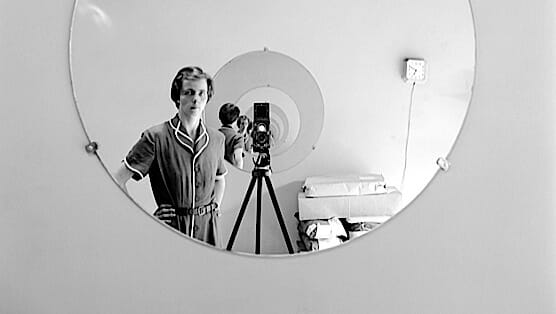
When Vivian Maier died at the age of 83 in the spring of 2009, those who had known the woman remembered her as a nanny with a humorously stiff gait and a penchant for taking photographs. In the short time since Maier’s death, her narrative has been radically rewritten, her striking street photography celebrated in exhibitions from Los Angeles to London.
That such a private, peculiar woman could retroactively be recognized as one of the best photographers of the last 50 years is a testament to the untold great art being made under our collective nose. It’s an enticing story, and it’s breezily told in Finding Vivian Maier, a documentary that examines her path to the posthumous spotlight.
Directed by John Maloof and Charlie Siskel, the film begins with Maloof explaining how he purchased a box of old negatives in 2007 for a book project but never ended up using them. Years later, he became obsessed with the photos—arresting, unassuming street scenes from the 1950s and ’60s in Chicago and New York—and was curious who had taken them. His journey led him to a woman named Vivian Maier, who made her living principally as a caretaker of young children. Finding Vivian Maier interviews the now-grown kids she nannied, as well as their parents and others who were friends of the reclusive woman.
Finding Vivian Maier is in a tradition that includes Stone Reader and Searching for Sugar Man: documentaries whose makers are trying to track down forgotten or obscure artists whose work has deeply impacted them. So what we have here is a detective story, with Maloof and Siskel looking for clues into Maier’s personality and thought process. (For instance, she shot more than 100,000 photographs but never had them developed. Could she not afford it, or did she not want her work seen by the public? What drove her to so obsessively chronicle her world but never enjoy the fruits of her labor?)
In its early stretches, Finding Vivian Maier quietly marvels at the potentially rich secret lives of those around us: The filmmakers’ interview subjects are uniformly astonished that the woman they thought they knew was some sort of great artist. A bit of a hoarder and not someone who liked physical contact, Maier comes across in these first-hand accounts as a lovable loon: a less-magical Mary Poppins who enjoyed taking her wards on photographic expeditions but didn’t dispense a lot of spoonful-of-sugar sage advice.
That affectionate, slightly puzzled mosaic of impressions stands in stark contrast to her powerful photography, which is full of striking soulfulness and humor. Some documentaries about unappreciated talents have to strain to make their case: All Finding Vivian Maier has to do is display her work to demonstrate the depth of her skill. Because she worked in silent still images—and because she’s no longer alive to explain her artistic approach—a beautiful mystery hovers over every shot as we try to look through the images to decipher the woman who brought them to life.
The documentary gets some mileage out of the question of what the true purpose of art should be—Is it for the artist? For the audience?—and whether Maier would have approved of her personal passion becoming a public commodity. (Considering how temperamental she could be, at least according to the film’s subjects, it’s a fair bet she might have been deeply rattled by the exposure.) But Finding Vivian Maier doesn’t shy away from the potentially darker aspects of her life—particularly, both a few interviewees’ unpleasant memories of the way she treated them as kids and her bleak final days. The filmmakers want to honor Maier’s talent, but they don’t want to canonize the woman.
With that said, though, there are a few nagging limitations to Finding Vivian Maier that undercut its power. The most prominent is that Maloof, who owns a great deal of her work, never quite acknowledges his own vested interest in the subject matter. By raising Maier’s profile, he also stands to profit on the selling and licensing of her photos, and so the documentary is somewhat compromised: It alerts us to her less-savory side but ends on an overwhelmingly positive note that suggests that we shouldn’t doubt her artistic (and personal) worth. I’m not questioning Maloof’s sincerity, but his involvement can’t help but nudge Finding Vivian Maier a little toward smoothly produced advertisement rather than just coolly objective investigative piece.
Even then, though, it’s hard to criticize too harshly when Maloof has proved a worthy advocate for this curious woman’s remarkable eye. Maier may not have been pleased that the world now knows about her, but Finding Vivian Maier persuasively argues that photography is the better for it. Her work is haunting—the mystery and complexity of her life even more so.
Tim Grierson is chief film critic for Paste. You can follow him on Twitter.
Directors: John Maloof, Charlie Siskel
Release Date: Mar. 28, 2014